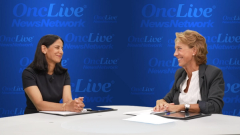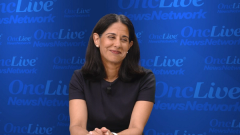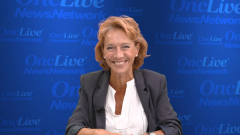
HR+ Metastatic Breast Cancer: Overview of the Current Treatment Landscape
Opening their discussion on the HR+ metastatic breast cancer treatment landscape, expert oncologists share a broad overview of treatment modalities in this setting.
Episodes in this series

Transcript:
Sara M. Tolaney, MD, MPH: Hi. Welcome to our post–ESMO [European Society for Medical Oncology Congress 2022] conference perspective. Today we’re going to be discussing metastatic hormone receptor–positive breast cancer. My name is Sara Tolaney and I’m from the Dana-Farber Cancer Institute in Boston, Massachusetts. I’m joined by my colleague, Eva Ciruelos Gil of University Hospital 12 de Octubre and SOLTI Group in Madrid, Spain. Today we’re discussing all the impressive data that have come out over the past few days. Could you tell us a little about how you’re treating your patients who have metastatic hormone receptor–positive disease? What are you thinking about when integrating therapies?
Eva M. Ciruelos Gil, MD, PhD: This is the most important question, in terms of clinical guidelines and experience, for a majority of patients with advanced breast cancer. Seventy percent of them will have a luminal-type disease. They will live longer, longer, and longer, fortunately. However, there are many questions that arise. As soon as we have new data, we have new questions as well. I think that the first-line treatment with any type of hormonal therapy plus CDK4/6 inhibitors is standard. A small percentage of patients who are not candidates, or shouldn’t be, should be treated with these approaches, because there isn’t an exception for that in the subgroup analysis of the 7 different phase 3 trials. All patients will benefit from these combinations. Pre- and postmenopausal patients, as soon as possible, should be treated with abema [abemaciclib (Verzenio)], palbo [palbociclib (Ibrance)], or ribociclib [Kisqali] plus aromatase inhibitors or fulvestrant [Faslodex]. When a patient progresses, we should have the information on PIK3CA status so we have the best second-line therapy for them. In case PIK3CA is mutated, we should combine alpelisib [Piqray], which is currently approved and reimbursed in majority of countries, with fulvestrant or letrozole—supported by the BYLieve [NCT03056755] trial. We have some nice data on different hormonal combinations in the post-CDK scenario. In non–PIK3CA mutated patients, I think it’s a risky to maintain a hormonal therapy alone because results have not been nice. I think that type of therapy is still there. We learned to monitor everolimus many years ago since the BOLERO-2 trial [NCT00863655] results led to approval of this drug in combination. This was the first targeted combination with a hormonal treatment. We have revisited everolimus for non–PIK3CA mutated patients avoiding monotherapy with 1 single hormonal therapy in the post-CDK scenario because median progression-free survival in those patients is so poor. SERDs [selective estrogen receptor degraders] may be a new option. We’ll talk about them. With progressive disease, we have few opportunities]to try to reuse hormonal treatments. Maybe now is the time to start chemotherapies in the first line. Maybe capecitabine [Xeloda] would be a good option in patients who don’t need, or don’t want to go into, IV [intravenous] chemotherapies. Capecitabine and oral vinorelbine [Navelbine] are good options. IV therapies include taxanes or anthracyclines that have been already approved in this setting. The main message is to give the best therapy as soon as possible. I think that the best therapies are the new combinations of CDK inhibitors with hormonal treatment. This is the first-line impact on overall survival and progression-free survival. Afterward, we try to explore all the possible combinations with hormonal treatment before chemotherapy, but we try to avoid monotherapies with hormonal therapies because in the post-CDK scenario we have an urgent clinical need.
Transcript edited for clarity.









































